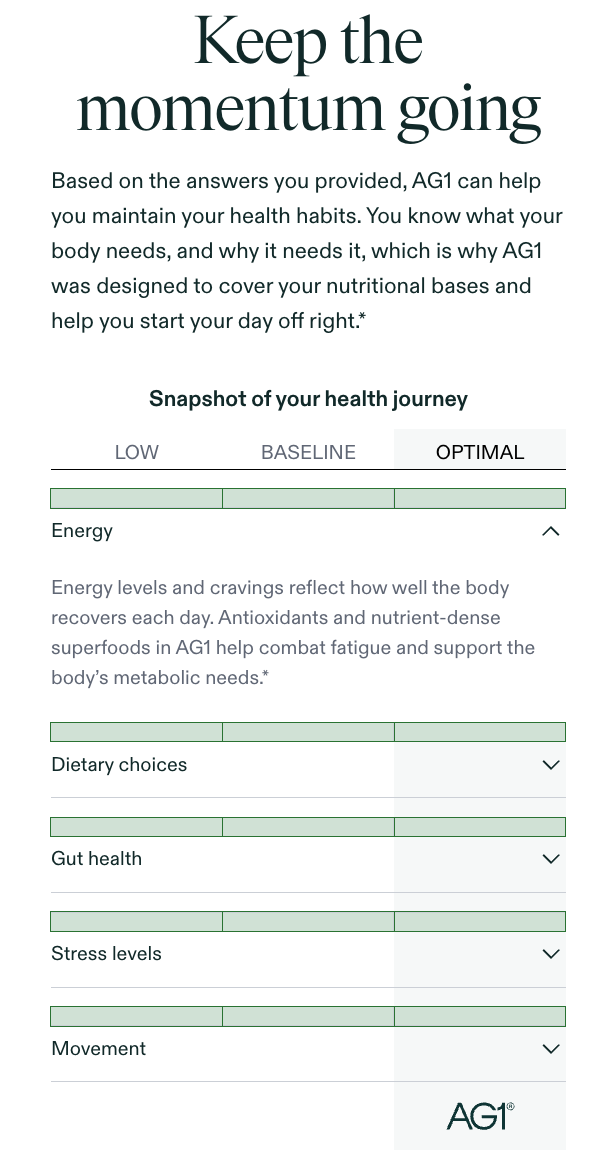It has sponsored major YouTube channels and podcasts, like Joe Rogan’s and Lex Fridman’s. One of the top science podcasters, Andrew Huberman, is even an official partner of the product. It was also the sponsor of the 2023 Association of Pickleball Players Tour. Seemingly everyone is drinking it and saying they just “feel better.”
AG1 and its marketing campaign cannot be avoided.
Made by the company Athletic Greens, AG1 is a green powder. You add it to some liquid, mix it up, and drink it once a day. Except that it’s so much more than that. One of the many promotional emails I received about it tells me that it “effectively covers your bases,” a blend of 75 ingredients “carefully curated to nourish all of the body’s systems holistically.” It’s making me wonder how we ever evolved from unicellular organisms before the advent of AG1.
Should you be drinking AG1 every day “just in case?”
The good news with AG1 is that it is NSF certified, meaning that a recognized third party tests the product to make sure the powder really does contain what the label states and to test it for any unsafe levels of contaminants, such as microbes and heavy metals. This is good because dietary supplements (and AG1 qualifies as one) are often adulterated or contaminated, as they are not held to the same regulatory standards as pharmaceuticals. (In the United States, supplements are not regulated, period.)
The bad news is that, once we strip AG1 of its marketing hype, we are left wondering who really needs it in the first place.
Just in case
AG1 may be the cool new kid on the block, but its main claim to fame is quite banal. Remember Flintstones vitamins? At its core, that AG1 green smoothie is not that different. It is, in part, a multivitamin and mineral supplement, with most of the vitamins it contains being in excess of their recommended daily values. For instance, AG1 includes 467% of the daily recommended value of vitamin C and 1,100% of vitamin B7’s. Both of these vitamins are water soluble, so if you are getting an excess of them through your diet or your supplementation, you simply pee it out, which increases the financial value of your urine.
Other vitamins—specifically A, D, E, and K—are fat soluble and they can accumulate in the body and cause damage in large enough quantities. Vitamins, despite their health halo, are not always benign. Smokers, for example, can be told to avoid taking large amounts of beta-carotene (which is turned into vitamin A in the body), as two studies have linked high concentrations of this supplement to an increased risk of lung cancer in smokers. Similarly, vitamin K can make blood thinners like warfarin less effective, so multivitamin supplements should not be seen as a universal boon with no downside to anyone. Some people also take “antioxidant” supplements, not realizing that these already contain vitamins like A, C, and E, so they may be ingesting more vitamins than they realize.
But if you are neither a smoker nor on blood thinners, the idea of taking a multivitamin shake like AG1 may tempt you. After all, what if you are not getting enough vitamins through your diet? AG1 becomes a safeguard against deficiencies. That thinking goes all the way back to Miles Laboratories. They were the first to market a one-a-day multivitamin in the 1940s, introducing their customers to the idea of a nutritional insurance. Take one a day, just in case. It’s a great marketing gimmick (and it has paved the way for the eight-billion-dollar-a-year multivitamin industry in the United States), but you may be surprised to learn that most people are getting enough vitamins and minerals from their diet. In a study of 90,771 American men and women ages 45 and older, three quarters of them were getting enough of these nutrients from the food they ate. Taking a multivitamin and mineral supplement bumped that fraction up a bit, but it also led to a little over one in ten getting more vitamin A, iron, and zinc than they needed.
When it comes to multivitamins, it’s usually the people who need them the least who purchase them, while those who could really benefit from them—like people of low socioeconomic status whose diet is deficient in some nutrients—are least likely to take them. At a cost of USD 79 per month with an additional USD 9 in shipping to Canada and the U.S., AG1’s price tag of nearly 3$ a day is likely to be an unnecessary form of health insurance for the worried well. Time and time again, bodies of experts have argued against the routine taking of multivitamins, as they show little to no benefit in preventing disease. There are recommendations for specific groups of people to supplement in specific ways, but a multivitamin as a form of health insurance is simply not borne out by the data. When in doubt, consult a medical doctor or a registered dietitian.
AG1, however, is more than just a multivitamin and mineral supplement. It’s also a blend of every wellness-anointed ingredient, very little of which is supported by science.
Like a wellness bingo card
Looking at AG1’s massive ingredients list, I saw a number of words that made me roll my eyes. Alkaline. Raw. Superfood. Adaptogen. These all refer to unsubstantiated health trends. There is no such thing as a superfood. You can’t alkalize your body (nor should you want to) by eating foods and drinking fluids with a basic pH, as your blood has buffers in it to keep its pH within a very narrow range. Cooked food is not making us sick; in fact, heating up food kills pathogens.
And adaptogens? These are plants and mushrooms, used in Asian folk practices and studied by the Soviets during World War II, claimed to help buffer our body against stress, but they lack evidence for their claims. AG1 contains a few, like rhodiola, eleuthero, and reishi and shiitake mushrooms. Besides the lack of support for their claimed benefits, they are whole plants and fungi, mixtures of molecules whose concentrations vary based on seasons and soil conditions, and whose final amounts in AG1 are undisclosed. Rhodiola, for example, is a plant that contains polyphenols, glycosides, organic acids, essential oils, alcohols, proteins, sugars, and fats. Even if some of these molecules were shown to be beneficial, you wouldn’t know if you were getting the right dose from one AG1 pouch to another.
Where AG1 might actually come in handy is in the fruit and vegetable powders it contains. Fewer than 1 in 3 Canadians reports getting enough fruits and vegetables daily based on the recommendations made in Canada’s Food Guide; in the United States, that fraction hovers between 1 in 8 and 1 in 10. The number one barrier Canadians report is price, so if you’re looking to get enough fruits and vegetables but don’t want to break your budget, first keep an eye on what’s on sale at your grocery store. If you really prefer a processed powdered mix of fruits and vegetables, though, keep in mind that there are more affordable options out there than AG1.
Everything else in AG1 is of questionable benefit at best. Inulin is a source of dietary fibre, and fibres are good overall, but inulin can give you gas especially if you have IBS. Coenzyme Q10, which our body naturally produces, may have cardiovascular benefits when taken as a supplement, but the jury is still out. Cocoa bean polyphenol extract has a lot of hype attached to it, but when put to the test (a test that was financed by a chocolate company, no less), it failed to deliver. Spirulina, a type of alga, is included in AG1 but I’m not sure why. When sold as a stand-alone supplement, it is promoted as a source of beta-carotene, iron and protein, but the first two are already included in AG1, and at two grams of protein per scoop of AG1, you’re not getting a significant source of protein overall.
AG1 also contains a digestive enzyme, bromelain, which comes from pineapple. Even though it has been used historically by people native to Central and South America to help with digestion, and although it technically can digest proteins in the laboratory, I had a hard time finding human studies demonstrating that this supplement helps humans digest food. A couple of papers published in Italian and German between 1970 and 1972 are the closest I could find, but I could not access them online. This sort of forgotten work is unlikely to give us definitive answers.
Then, there are the probiotics: the bacteria L. acidophilus and B. bifidum. Once again, probiotic hype overtakes the science. We know, for example, that probiotics can prevent the diarrhea that sometimes accompanies the taking of antibiotics, but we still do not know which strains and doses to recommend. We know that fecal transplants can help people suffering from an infection by the C. difficile bacterium, but beyond these examples, we run short of evidence-based recommendations. AG1 claims it has 7.2 billion colony-forming units (CFUs) of its probiotics, which is seven times as many as your average probiotic yogurt. Does that make a difference, especially if you’re healthy? We do not know.
So, who will really benefit from taking AG1 daily?
A quiz with only one possible answer
The AG1 website mentions a study showing that participants who drank AG1 noticed less bloating and felt more energetic. The problem is that there was no control group; the outcome was evaluated via subjective self-reports; and only 35 adults participated. There is not much to conclude here other than people reported feeling better after drinking a green liquid they were told would make them feel better.
Too many people seem to believe that vitamin supplements are energy pills. They’re not. If, like most Canadians and Americans, you are getting enough vitamins from your diet, taking more will not sharpen your focus. For that, you need caffeine.
There is a quiz you can take on the AG1 website to “find out if AG1 is right for you.” I wondered if there was any way the answer would be, “No, our product is not right for you.”
I tried to answer the questions the way someone with optimal nutrition and who regularly exercised would, someone who would be the least likely to need support on their “health ownership journey,” as the company puts it.
I said my energy levels were even, that I ate whole foods, had regular bowel movements, was never stressed, and that I exercised a few times a week. I was still recommended AG1. I was told my exercise routine wasn’t optimal, so I redid the quiz, stating I exercised more days than I rested, and even though it showed my scores as optimal across the board, it again recommended AG1.

I didn’t get the results on the website, though. I had to give the company my email address before I was allowed to know if AG1 was recommended for me, so I was added to their mailing list which, I suspect, was the goal all along.
There is a revealing dichotomy worth pointing out here. My experience of medical professionals is that they do not want you to be on unnecessary medication. They often prompt you to taper the amount until you find the minimally effective dose, and they will refuse to prescribe something they do not think will benefit you. In the land of wellness and alternative medicine, however, I see the exact opposite. Everyone is told they can benefit from every intervention. When a supplement has allegedly cured you, you are told to continue taking it as maintenance therapy. The welcoming arms of wellness never tire.
AG1 is right for everyone, apparently, “just in case,” much like how Miles Laboratories taught us to think eighty years ago. The more things change, the more they stay the same.
Take-home message:
- AG1 is a very popular supplement powder used to make a one-a-day smoothie filled with 75 ingredients
- The vitamins and minerals it contains are based on the idea that the average person doesn’t get enough of these nutrients through their diet, which contradicts scientific evidence
- AG1 also contains a digestive enzyme, adaptogens, and probiotics, despite the fact that there is no robust evidence that they offer benefits to humans







